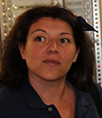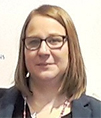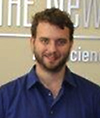(https://doi.org/10.55612/s-5002-038)

Iina Aaltonen
is a Research Scientist at VTT Technical Research Centre of Finland Ltd. Her research work is concentrated on human factors, usability, and user experience in several domains. She has special expertise in human-technology interaction with emerging technologies and human-robot collaboration. Her doctoral thesis in 2018 focused on user studies with wearable, multimodal and augmented reality solutions.

Susanna Aromaa
is a Senior Scientist at VTT in the Human Factors, Virtual and Augmented Reality team. She finished 2018 her doctoral dissertation on topic “Virtual prototyping in evaluation of human factors and ergonomics of human-machine systems”. Dr. Aromaa has participated in many European and national projects, and worked as a project manager and work package leader in the projects. She is interested in human factors/ergonomics in design of industrial workplaces and has experience of the use of virtual reality systems for improving ergonomics, usability and safety.

Dominique Aubert
is Research Engineer, in the CRED (Cognitive Research and Enactive Design) team of the Costech Laboratory (Knowledge, Organisation and Technical Systems) at UTC. He is in charge of software development for the researchers and PhD students research projects. He has designed and developed the Tactos software suite as well as several tactile interfaces intended for visually impaired and blind persons, he maintains and makes evolve on the basis of the needs and feedbacks from end-users.

Saskia Böck
graduated in Psychology at the Ludwig-Maximilians University in Munich in 2017 and is currently studying Mechanical Engineering at the Technical University of Munich. Her main research interest is the development of adaptive virtual training systems.

Tone Bratteteig
s professor in design of information systems at the University of Oslo. Her research interests center around design and use of information systems: the practices of design and use and the competencies involved in them as well as how design and use mutually influence each other. She has been teaching digital design at all university levels for a number of years. Her research areas include Computer Supported Cooperative Work, Participatory Design, Interaction Design, and Design of Information Systems.

Auriol Degbelo
is postdoctoral researcher at the Institute for Geoinformatics, University of Münster, Germany. His current research interests include semantic integration of geospatial information, re-use of open government data, and interaction with geographic information.

Ines Di Loreto
is associate professor at UTT (Université de technologie de Troyes) in the Tech-Cico team. After a master degree in philosophy she obtained a PhD in Computer Science with a thesis investigating Social Media and Multi Users Virtual Environments with a prevailing interest in issues related to the representation of the self. Currently interests involve the use of social application, Tangible User Interfaces (TUI), and Informal Learning as means to promote social change.

Guiying Du
is a doctoral candidate at the Institute for Geoinformatics, University of Münster, Germany. Her research focuses on the potential of public displays for public participation in urban planning. She is also interested on gestural/mobile interaction with immersive video environments.

Joona Elo
is a User Experience (UX) design expert at Konecranes Research and Innovation department. In Konecranes Joona is working as designer in multiple digital development projects and managing research activities around new technologies and interaction methods especially applying to industrial maintenance service. His mission is to improve UX in industrial working environment.

Gaëlle Garibaldi
is a PhD student in the COSTECH laboratory (Knowledge and Organization of Technical Systems) of the Compiègne University of Technology, within the CRED team (Cognitive Research and Enaction Design). Her research focuses on technical mediations of Presence, and how they transform our experience, in a phenomenological and experimental way. After a bachelor\'s degree in philosophy, she studied Philosophy and Fundamental Cognitive Sciences and obtained a research master\'s degree at the Ecole Normale Supérieure de Lyon.

Hanne Cecilie Geirbo
is a technology-anthropologist. She is an associate professor sharing her time between Department of Informatics, University of Oslo, Department of Information Technology, Oslo Metropolitan University, and Institute of Urbanism and Landscape, Oslo School of Architecture and Design. Her main research interest is the interplay between the development of infrastructure and the development of society. She is exploring flexibility as a principle for developing sustainable infrastructures in urban settings as well as in the context of rural electrification in low-income countries.

Charles Hahn
PhD student in the Department of Anthropology and a member of the Data Ecologies group at the University of Washington. He research is concerned with the cultural politics of scientific information systems and practices in Alaska.

Jaakko Hakulinen
is a university researcher at Tampere Unit for Computer-Human Interaction (TAUCHI) at the University of Tampere, Finland. His research interests include multimodal interaction utilizing large scale of technology including gesture-based interaction, speech-based interaction, intelligent environments, virtual reality, and data visualizations. Hakulinen received his Ph.D. in interactive technology from the University of Tampere in 2006.

Juho Hella
is a Research Scientist at VTT Technical Research Centre of Finland Ltd. Her research work is concentrated on human factors, usability, is a researcher at Tampere Unit for Computer-Human Interaction (TAUCHI) at the University of Tampere, Finland. His research interests include speech-based and multimodal interaction in industrial and artistic settings, and expressiveness of interaction. Hella received his M.Sc. in human-technology interaction from the University of Tampere in 2015.

Andrew Hoffman
Research Scientist in the Department of Human Centered Design & Engineering at the University of Washington. Andrew\'s work is motivated by an interest in coordination practices and issues of interoperability in US data science and biomedicine.

Petri Honkamaa
is a Senior Scientist at VTT Knowledge intensive products and processes. He received his M.Sc. (Tech.) in Computer Science from the Lappeenranta University of Technology in 1997. After the graduation he started his career at VTT focusing first on video compression technologies. Later research topics include various computer vision and optimization algorithms. Currently the focus is on 3D tracking algorithms and Augmented Reality applications. For three years (2011-2013) he lead an 8-person research team on the topic of 3D Tracking technologies. He has also had a key role developing several widely used software modules in VTT, including video compression method MVQ, open source augmented reality library ALVAR and more advanced 3D tracking library ALVAR Mobile.

Sarah Inman
PhD student in the Department of Human Centered Design & Engineering. Sarah studies the sociotechnical practices of scientific knowledge production, specifically the practices of domain scientists and data scientists.

Eija Kaasinen
is a Principal Scientist at VTT, being in charge of strengthening the impact of human perspective in the research on technical innovations and developments. She has lead several research projects facilitating and coordinating industrial cooperation in developing new human-centric solutions for industrial use. Her research interests include developing user experience driven design and co-design approaches to the design of complex industrial systems and services.

Tuuli Keskinen
is a postdoctoral researcher at Tampere Unit for Computer-Human Interaction (TAUCHI) at the University of Tampere, Finland. Her research focuses on evaluating the user experience of interactive systems. She has participated in several projects having both academic and industrial partners and a variety of contexts and user groups. Keskinen received her Ph.D. in interactive technology from the University of Tampere in 2015.

Christian Kray
is a professor in Geoinformatics at the Institute for Geoinformatics (ifgi), Münster university, where he heads the situated computing and interaction lab. His research interests include how people interact with spatial information, how to design and evaluate location-based services, and how to make smart cities accessible to all. Current projects at his lab investigate issues such as location privacy, deictic communication, inclusive cities and immersive video environments.

Kadri-Liis Kusmin
is a PhD student of Information Society Technologies at Tallinn University. Her research is focused on the rapidly changing competency requirements of the new digital and industrial age, academia and industry cooperation in shifting from preparing employees for jobs to preparing them for their entire careers, and supporting their careers through life long learning. She received her MBA in Management of Information Technology from Tallinn University in 2014.

Karine Lan Hing Ting
is researcher at ActivAgeing Living Lab, Université de technologie de Troyes, France. She obtained a PhD in Sociology with a thesis investigating work practices in offshored call centres, with a focus on mediated communication, collaborative work and intercultural interactions. Her current research interests include the design, iterative evaluation and use of health, Ambient Assisted Living (AAL) or social robotic technologies for older adults, using a Human-centred and Participatory Design approach.

Charles Lenay
Full Professor of Philosophy and Cognitive Science at UTC, was Director of Costech Laboratory (Knowledge, Organisation and Technical Systems) at UTC. After serving as Vice-President of the French Association for Cognitive Research (ARCo), he created in 1995 the Perceptive Supplementation Group (GSP) in the framework of this laboratory. His research interests concern the question of cognitive technologies: how tools and technical devices participate in cognitive activity in the broad sense – perceiving, reasoning, memorizing, interacting. For this he created a minimalist experimental paradigm allowing a dialogue between cognitive psychology and phenomenology. At the same time, he has developed a series of perceptual substitution devices for blind people: tactile access to digital environments (Tactos, Intertact, Dialtact).He has directed 11 theses, published nearly 200 articles, books and lectures, and filed 3 patents.

Mikael Leppä
is the Head of User Experience Design at Wärtislä Corporation. He develops and manages the companys global design team, responsible for improving and aligning the end-user experience of both customers and company staff operating in the field. He has a professional history of Industrial and User Experience Design mainly focusing on control environments and IoT solutions in the B2B sector.

Tobias Ley
is a Professor of Learning Analytics and Educational Innovation at Tallinn University where he leads the Center of Excellence in Educational Innovation. His research has won several awards including the state science award of the Estonian Academy of Sciences in 2020, and the European Research Excellence Award for Vocational Education and Training in 2018. He has published over 100 scientific articles. Tobias has acted as general chair of the European Conference on Technology-enhanced Learning (EC-TEL) and was a member of the editorial board of the IEEE Transactions on Learning Technologies. His research interests are in technology-enhanced learning and learning analytics, human computer interaction, adaptive and collaborative learning technology. Tobias holds a PhD in Psychology and Knowledge Management from the University of Graz in Austria.

Frieder Loch
graduated in human-media interaction at the University of Twente in Enschede in 2012. After working three years as a usability engineer for mobile applications, he joined the German Research Center for Artificial Intelligence in 2015 as a Ph.D. student. He joined the Institute of Automation and Information Systems at the Technical University of Munich in 2017. His main research interest is the development of adaptive virtual training and support systems.

Ville Mäkelä
is a postdoctoral research at TAUCHI, and will start as a postdoctoral researcher in LMU Munich in 2019. He gained his Ph.D. in 2018 from the University of Tampere, Finland. His primary research interests are in ubiquitous computing, particularly novel interaction techniques, cross-device interaction, and public displays. His other research interests revolve around augmented and virtual reality, such as the viewing of 360° videos using head-mounted displays.

Nela Murauer
is a mechanical engineer who studied at the Technical University Munich. Since 2013 she has been working for the BMW Group in different departments, such as Quality Management, Assembly Planning and Lean Management. From 2016 till 2018 she worked as PhD student for the BMW Group in the innovations-team of the logistics planning focusing on user-centered aspects of a full-shift usage of smart glasses in order picking. After finishing the PhD thesis, which was supervised by TU Berlin, Nela Murauer works in logistics department of the BMW Plant Munich and is still responsible for smart glasses in logistics for the whole BMW Group.

Antti Niemelä
is a project manager at Lapland University of Applied Sciences, working as part of the maintenance related research team of the Industry and Natural Resources unit. He has worked in multiple maintenance, embedded systems, information systems and visualization related projects. His focus is in applying latest visualization and measurement technologies to industrial and other maintenance related topics.

Marco Painho
is a Full Professor at NOVA Information Management School (NOVA IMS) of the Universidade Nova de Lisboa and Coordinator of the Master Programs in Geospatial Technologies and Geographic Information Systems and Science. He holds a PhD in Geography from the University of California in Santa Barbara. His research interests include Geographical Information Systems and Science, (Spatial) Decision Support Systems, Data Integration, Spatial Analysis, User Generated (Spatial) Content, Information Infrastructures, New Technology Implementation, GIS Education and Distance Learning (e-learning). He is author and editor of over 200 publications including books, chapters in books and articles. He has published in several national and international journals and conference proceedings.

Juha Parviainen
is a data scientist working in a machine industry. He has specialized in equipment maintenance and service business. His endeavor is to empower field technicians with relevant and up-to-date information so they can perform at their best.

Nerina Pflanz
is a health scientist who specialises in health governance and medical research. She works both with qualitative and quantitative methods on questions related to epidemiology. At the BMW Group she supported the research project concerning smart glasses in order picking for one year. She is currently affiliated with the IBE at the Ludwig-Maximilians-University (Munich, Germany).

Ville Rauhala
is a project manager at Lapland University of Applied Sciences. He is working as part of the operation & maintenance research team of the Industry and Natural Resources unit. He has worked in several operation & maintenance related projects with close cooperation with industry and SMEs. Focus of those projects has been in education of maintenance practices, developing new methods for maintenance and applying new digital solutions for maintenance.

David Ribes
David is an Associate Professor in the Department of Human Centered Design & Engineering at the University of Washington. He is a sociologist of science and technology who focuses on the development and sustainability of research infrastructures. His methods are ethnographic, archival-historical and comparative.

Santeri Saarinen
was a researcher at Tampere Unit for Computer-Human Interaction (TAUCHI) at the University of Tampere, Finland, when the research discussed in this article was conducted. He is now an XR Specialist at Metropolia University of Applied Sciences in Helsinki, Finland. His research interests include virtual reality, augmented reality, and novel interaction techniques. Saarinen received his M.Sc. in human-technology interaction from the University of Tampere in 2014.

Sanni Siltanen
is Expert in Innovative Maintenance Methods at KONE corporation. Currently she in investigating how novel technologies, such as AR, can be utilized to improve industrial maintenance. She has long research career in augmented and mixed reality, and applying them for different industrial needs. Her passion is to bring technology from laboratory to real use. Her current interest is to examine how digitalization, IoT, and Industry 4.0 concepts can be utilized to make things better, more efficient and user friendly.

Steve Slota
Research Scientist in the Department of Human Centered Design & Engineering at the University of Washington. He has a PhD from University of California, Irvine, in Information Science. Steve is sometimes an infrastructure.

Kairit Tammets
is the head of Centre for Educational Technology (CET). She received a PhD in educational sciences in 2013 from the Tallinn University. Her research has been related with collaborative knowledge building and professional development at the workplace, especially in teacher education context. Her interest is also related with competency-based digital learning ecosystems for supporting workplace and informal learning. Recently Kairit has been contributing to the design and development learning analytics methodologies and tools in several local and international projects of CET.

Matthieu Tixier
is Assistant Professor at Troyes University of Technology in the Institut Charles Delaunay research lab (ICD, CNRS), Tech-CICO team. His research is grounded in Computer Supported Cooperative Work, Human Computer Interaction and Accessibility. He is interested in the development of design approaches and tools intended to people with special needs related to their physical, social or cognitive condition. This research perspective intertwines technical with social aspects and has been applied in the context of social support practices among informal caregivers (MISS and AAL TOPIC projects) as well as for the development of participatory design workshops with visually impaired persons (ITOIP and SEEIT projects).

Jouni Törnqvist
is a Head of R&D at Bronto Skylift, being in charge of human interaction between man and Bronto platforms. He has lead several research projects related to user interfaces, sound interaction and haptic feedback inside and outside of the company. He has also lead development projects related to remote diagnostics, Internet of Things and WEB portal for service support and operations. Currently he is leading all the new product research and development projects at Bronto Skylift.

Markku Turunen
is a Professor of Interactive Technology at the University of Tampere. He is leading a research group on pervasive interaction and an international master\'s programme on human-technology interaction. His expertise includes novel interactive solutions for challenging environments, such as industrial settings, and their evaluation and analysis methodology. He has more than 200 publications on human-technology interaction.

Antti Väätänen
is a senior research scientist in Human factors and Augmented Reality area at VTT. He has an extensive experience in concept of operations, human factors, wearable user interfaces and Augmented Reality. He has conducted several field trials and user experience studies. His research activities have been related to domains such as human-machine interaction, new ways of work and demanding operating environments.

Juha Valtonen
is a project engineer at Lapland University of Applied Sciences, working as part of the Operation and Maintenance research team of the Industry and Natural Resources unit. He has worked in multiple maintenance, embedded systems, information systems and visualization related projects. His main research interests currently are developing AR and VR solutions for maintenance and other fields.

Guri Verne
is a researcher at the University of Oslo, where she has been teaching design and research methods at master level for many years. Her PhD thesis from 2015 was about automation of public services from the citizens’ perspective, where she showed that while automation reduced tasks for the citizens doing their taxes it also introduced new and unfamiliar tasks. Educated as a theoretical computer scientist, her current research is in Computer Supported Cooperative Work, Participatory Design and Information Systems.

Birgit Vogel-Heuser
is a full Professor and Director of the Institute of Automation and Information Systems at the Technical University of Munich, Germany, since 2009. Her main research interests are systems and software engineering, and modeling of distributed and reliable embedded systems. She was a coordinator of the Collaborative Research Centre SFB 768: Managing cycles in innovation processes – integrated development of product-service systems based on technical products, member of acatech, and chair of VDI/VDE working group on industrial agents and vice chair of IFAC TC 3.1 computers in control.

Charles Woodward
is a Principal Scientist at VTT. He is the founder of Augmented Reality research at VTT. He was nominated Research Professor of Multimedia Technology in 2004, Research Professor in Augmented and Virtual Reality in 2010, and Principal Scientist since 2014. Over the years, Woodward and his team at VTT have produced world leading AR solutions from 3D tracking, entertainment and games, with current research emphasis on AEC and industrial applications.
